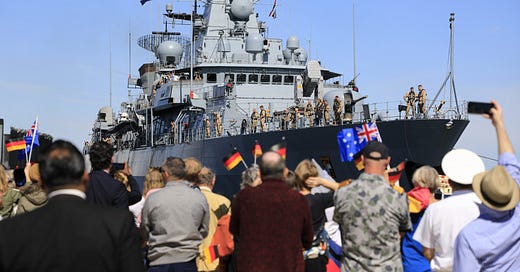Things are moving quite ‘fast’ these days, and it’s not even a week since last Sunday’s elections in Germany. Yet, there are numerous indications of what appears to be a new ‘feature’ of ‘Western’ democracies (ahem), by which is meant reports of irregularities and electoral shenanigans, but this time it’s not the ‘exceptional’ U.S. of A., no, this time the reports are reaching us from its continental European aide-de-camp, Germany.
German media report incl. the full set of time-honoured problems, from 352 delayed and to-be-ignored absentee ballots in Mecklenburg-Vorpommern (via Der Spiegel) to reports, from Berlin, about scenes that are quite ‘worthy’ of the U.S. of A., by which is meant too many voters and too few ballots (same source, different item).
Still, given that the ‘systemic government parties’ in Germany—which basically include everyone except for the right-wing ‘populist’ Alternative for Germany (AfD)—are fundamentally o.k. with each other, there is no need for massive election fraud. There is no ‘risk’ that any ‘opposition’ party will accede to power in the near future, which is amply illustrated by the current ‘talks’ between the ideologically opposed (doh) Greens and Free Democrats (once you digested this one, you may take a look at this, via Businessinsider, for visual proof).
Be that as it may, as a sidenote it may be mentioned that election fraud is a common trope among leading politicians from different countries these days. There is absolutely no need to revisit recent examples from, say, Venezuela to Belarus to Russia. It suffices to say that election monitoring—conducted by the OSCE—did not take place in the recent Russian parliamentary elections, for the international organisation deemed 60 observers insufficient. Yet, double standards are de rigueur these days, hence it is quite possibly ‘politically incorrect’ to mention that the recent U.S. elections were observed by half that number (30), as reported by German state media a year ago. In case you’re now wondering, if last Sunday’s German elections were monitored—I’m glad you asked: yes, by a grand total of four OSCE officials, as reported by RT Germany.
As a follow-up, let it be known that Russian media yesterday noted that, despite the shortage of natural gas in Europe, E.U. decision-makers still refuse to place more orders with Gazprom. Case in point, the Jamal pipeline (which crosses Belarus) is currently used at about a third of its potential capacity.
And now—for something quite closely related.
As indicated by the header, let’s briefly recap these past couple of days in terms of German foreign affairs (yes, there is such a thing, believe it or not). Watching the reactions to last Sunday’s elections, however, no-one spoke about, e.g., the fact that the frigate Bayern is currently en route to the South China Sea, as announced by (outgoing?) Defence Minister Kramp-Karrenbauer: ‘We are flying the flag for our values and interests, together with our partners and allies!’
Furthermore, no mention was made of a recent resolution by the E.U. parliament calling, in effect, for ‘regime change’ in Russia. While the full text runs around 100,000 characters, a short version thereof may be:
E.U. member states are a ‘shining city on the hill’ with full domestic tranquillity, but Russia is a ‘cleptocracy’.
The E.U. ascertains its ‘rights’ (rather: prerogatives) to an ever-closer engagement with its ‘eastern partners’, Armenia, Azerbaijan, Belarus, Georgia, Moldavia, and Ukraine; at the same time, Russia must not engage its neighbours in any way, shape, or form.
And, finally, calling for closer ‘Euro-Atlantic integration’, the resolution envisions the centralisation of foreign policy matters in Brussels while abrogating the principle of unanimity of its member-states.
It’s quite certainly a coincidence that the eponymous German foreign policy think tank (sic) calls for an increased willingness of the new government ‘to take greater risks’ by ‘blurring the boundaries between war and peace.’ Furthermore, the creation of ‘a sort of national security council, radical change of course in relations with China, [and] the EU’s inner alignment’ shall become the core tenets of future policy.
What could go wrong?
If anything, we should all heed the advice of former West German Economic Minister Egon Bahr (SPD, bio via Wikipedia), who once quipped:
The moment a politician starts speaking about his values, as opposed to his convictions, it is time to leave the room.




